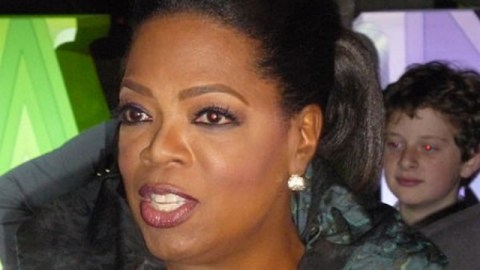Oprah Winfrey and the Misuse of Celebrity Entertainment Platforms

Oprah Winfrey, the internationally famous talk-show host, media proprietor, philanthropist, recently declared that disbelief in god is incompatible with experiencing wonder. However, Winfrey’s unjustified view on atheism is only the latest example of her quite consistent anti-science, anti-reason philosophies we should all be combating – not promoting – especially on platforms as large as hers.
Recently, Winfrey interviewed the incredible long-distance swimmer, Diana Nyad.
Chris Stedman, at CNN, summarises what happened next:
“Nyad identified herself as an atheist who experiences awe and wonder at the natural world and humanity.
Nyad, 64, who swam from Cuba to Key West last month, said “I can stand at the beach’s edge with the most devout Christian, Jew, Buddhist, go on down the line, and weep with the beauty of this universe and be moved by all of humanity — all the billions of people who have lived before us, who have loved and hurt.”
Winfrey responded, “Well I don’t call you an atheist then.”
Winfrey went on, “I think if you believe in the awe and the wonder and the mystery then that is what God is… It’s not a bearded guy in the sky.”
Stedman has penned a thoughtful response worth reading.
My problem isn’t merely this incident, but part of Winfrey’s overarching problem of promoting unreason; it was almost predictable that she’d use the wishy-washy abstraction of “god” to mean something, something wonder/awe/mystery. As Stedman highlights, why call phenomena we already have names for an entirely different – and already cloudy – term?
Winfrey, like many celebrities renowned for their good work, has managed to make herself into a powerful brand (this is not necessarily a bad thing, merely a statement of fact). Like Lady Diana Spencer – or Diana, Princess of Wales – and others, Winfrey has managed to make her first name sufficient for identification. This is incredible marketing.
Further, there is little doubt that Winfrey herself is a remarkable person, or that she has done much to help many people’s lives (perhaps saved countless). She’s done more to make the world better than me and, probably, most people reading this (her Angel Network has raised over $80 million dollars for charity).
But doing remarkable work in one area doesn’t excuse you from serious wrongs done in another. Immunity is not acquired through charity.
Winfrey has allowed her powerful platform to be the fertile soil for many modern day weeds of thinking, dominating the light of visibility: quack medicine and its practitioners, pseudoscientific babble under the guise of science, and even “therapy” that is, in fact, entertainment – not actual help vulnerable people need.
Her talk-show may have ended, but her legacy remains potent as ever – especially the solipsistic, uncritical and anti-scientific mindset she encouraged in her audience.
Entertainment is not incompatible with morality
Many people cynically dismiss worries of Winfrey and other “TV people” as entertainment.
The response seems to be: You can’t expect these shows and these people to be thoughtful, justified, scientific: that’s boring, it’s not what people want to watch after a long day’s work.
Yet, Cosmos, the beautiful 1980’s TV series about science, space and critical thinking, has reached over 500 million viewers; love him or hate him, Richard Dawkins is a best-selling author and hosts popular, well-made documentaries on many topics, including evolution; Lisa Randall wrote a best-selling book on science. The Daily Show and The Colbert Report regularly encourage critical thinking, via genius satire, with their acute take on daily news.
Popularity and accessibility are the hallmarks of entertainment. If we find these in science shows, from incredible communicators like Sagan, Randall, and deGrasse Tyson, in beautiful YouTube videos on critical thinking, then we can expect entertainment to be anchored by justification, evidence and reason.
To claim that because a show is entertainment, it cannot also be critical and thoughtful and smart is to deny the evidence (ironically, something that a good show would encourage).
Of course, even if TV shows should be constantly thoughtful, justified and so on, why should we demand this of Winfrey and her coterie? She is, after all, not the only offender.
Wider focuses
Targeting Winfrey here doesn’t mean ignoring others. There’s only so much space for attention and words, after all.
Second, we demand truth from those who claim to speak it. Imagine discovering that a specific TV network uses its massive platform of millions of viewers to push a specific agenda, hiding truth and counter-claims from its audience, resulting in them being less informed? Indeed, the audience is so uninformed, they know less about what is occurring in the world than those who don’t watch the news at all.
Of course, a study found this exact result concerning Fox News.
Objectivity is a goal and ideal, not reality, of course – but even opinions and perspectives can be informed. Similarly, no one is demanding Oprah Winfrey make science shows or be purely about cold matters of fact. That would defeat what she and her friends do. Yet, when it becomes detrimental, when her message and thinking and promotion of nonsense occurs, we need to call it out – as we would anywhere else.
Given her massive platform, this is particularly important. Winfrey doesn’t get a free pass because she’s put nice things under her audience members’ seats; she doesn’t get to push pseudoscientific babble to best-selling status without incurring justified criticism and being identified as unscientific; she doesn’t get to promote mindsets that easily led to the use of pseudomedicine or denial of proper medicine.
Yes, thinking is difficult. Yes, life is harder than The Secret and other idiotic books make it out to be. Plunging our heads deep into the mulch of nonsense promoted by such powerful people doesn’t make those problems disappear; in fact, they make the problems worse since so many refuse to face the problems and thus solve them.
Winfrey and other powerful celebrities who use their massive platforms to flood the attention spotlight with “nonsense as truth” deserve our criticism, not our uncritical devotion. It doesn’t matter how great someone is; it doesn’t matter how much good they’ve done; it doesn’t matter how much you love someone.
We must acknowledge that nonsense doesn’t become true because it’s your lover, your best friend, your favourite celebrity. Each, of course, warrants different responses – I wouldn’t give this response to a loved one as I would to Winfrey – but, at our base, we need to anchor our focus on truth and the reality of the situation; not credulous adherence to popular brands.
No matter how many children’s lives she’s saved.
UPDATE: My very smart friend, Dan Fincke, has an extended and charitable engagement with the whole Winfrey confronts atheism affair.
Image Credit: Greg Hernandez / WikiCommons (source)





